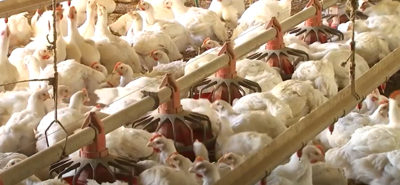DOVER, Del. – The Delaware Department of Agriculture has confirmed that a commercial broiler flock in Kent County has returned a presumptive positive result for the H5 strain of avian influenza. Preliminary testing was conducted by the University of Delaware’s Lasher Laboratory in Georgetown, a part of the National Animal Health Laboratory Network. Further confirmation is pending from the U.S. Department of Agriculture’s National Veterinary Services Laboratory.
The affected farm has been quarantined, and the flock is being depopulated to prevent the spread of the virus. State officials confirm that no birds from the farm will enter the food system.
Spread of the Virus
Avian influenza is a highly contagious respiratory virus that spreads quickly among poultry and some wild bird species, such as ducks, geese, and raptors. The virus is transmitted through nasal and eye secretions, manure, and contaminated equipment, clothing, and footwear.
Last week, Delaware announced presumptive positive H5 results in snow geese found at Prime Hook Beach. Additional test results are still pending. More than 850 dead wild birds, predominantly snow geese, have been reported to the Delaware Department of Natural Resources and Environmental Control. However, state officials believe the actual death toll is higher, as many birds die in remote areas.
Wild birds, particularly migratory species, play a significant role in spreading the virus. Birds that are not visibly ill can carry the virus inland, potentially exposing poultry farms and backyard flocks.
Steps for Poultry Owners
Poultry producers and backyard flock owners are urged to take immediate steps to protect their birds:
- Limit and monitor the movement of people, equipment, and animals on and off farms.
- Allow only essential workers and vehicles to enter farms.
- Disinfect equipment, vehicles, and footwear regularly.
- Avoid contact between domestic birds and wild or migratory birds.
- Isolate any sick birds and report concerns to a veterinarian or state hotline.
Commercial poultry producers should follow their company’s disease response protocols, while backyard flock owners can contact the Delaware Poultry Health Hotline at 302-698-4507 or email poultry.health@delaware.gov.
Avian Influenza Background
Avian influenza is caused by influenza type A viruses, which are classified by combinations of “H” and “N” proteins. These viruses can range in pathogenicity, with the H5 strain detected in Delaware being highly pathogenic.
Poultry producers are reminded that avian influenza outbreaks are not confined to coastal regions and can occur inland due to the mobility of wild birds, particularly snow geese. Increased vigilance is critical to minimizing the spread of the virus.
Reminder to Remain Alert
Delaware agriculture and wildlife officials emphasize the importance of biosecurity measures to protect poultry operations statewide. The situation remains under close monitoring as further test results are awaited.







